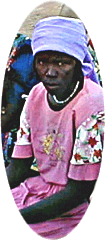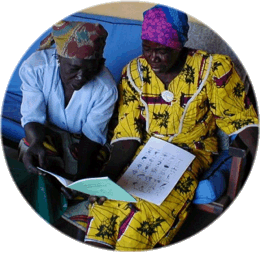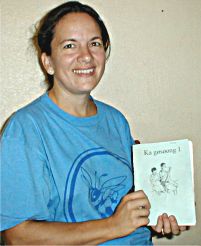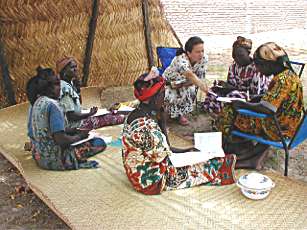
Download this newsletter (Word 97 120k) Return to homepage More back issues
On the front page Mark tries to make sense of the cultural undercurrents of recent problems we have experienced with the translation committee. On the back page, Diane tells the story of two of the first Kwong women to learn to read.
Work, money, and getting ahead in Africa
Observations on the role of wealth in African society drawn from Mark and Diane's recent problems with the Kwong translation committee
A few years back there appeared in a prominent missionary journal a cartoon depicting a well-meaning missionary flying over Bongo-Bongoland lobbing sacks of money over the side of his plane to help the poor churches of that under-developed country. What the well-meaning missionary could not see from his vantage point in the cockpit, but what was plainly visible to us viewing the cartoon was the mushroom cloud rising over the place where each sack of money hit the ground.
These past months have occasioned just such a mushroom cloud over our otherwise tranquil ministry in the village of Chageen. What began two years ago as a test of the integrity and management skills of the translation committee (not unlike Jesus' Parable of the Talents) ended as a test of wills which for three months pitted Old Moses and us against the members of the translation committee over the repayment of grain which they had misappropriated for themselves. Who could have imagined such a thing? The problem was finally resolved through the intervention of Moses the Younger who, hearing of the problems, came back to Chageen to lend his hand at bringing reconciliation.
Marriage is teaching me that, among other things, intractable problems are usually not just the result of obstinacy by one party or another, but often as not a profound divergence of expectations and assumptions. Such has surely been the case with our translation committee, not that I excuse their behavior one iota because of it, but as a consideration it does shed light on one of the challenges of the missionary task, as well as explain some of the perennial backwardness of Africa.
| A salary is a monument to a relationship and not compensation for services rendered in any normal sense of salary at all. |
Money and commodities to an African, or at least to the guys on our translation committee (whom I am taking to be representative Africans) does not bear any intrinsic relationship to work or merit. For example, the monthly salary we have paid the men for many years must be paid, much to our chagrin, whether the men work or not - a policy established by the Chadian church leaders over us (whom I also take to be representative Africans). The reason for this is that in Africa a salary is a monument to a relationship, and not compensation for services rendered in any normal sense of salary at all. It is a kind of social glue that declares to them and everybody else that they are “mine”. Hence, for us to say to them “you must pay for the grain you took” was not simply a disinterested (if unpleasant) economic fact of life, but a very personal affront to what they perceived as the underpinnings of our relationship.
The men of the translation committee, and indeed the whole village of Chageen have had enough experience with me over the past 10 years that one might reasonably expect them to anticipate a certain amount of inflexibility on our part in the matter. I have no doubt that they did so. But another assumption short-circuited whatever wisdom that anticipation might have afforded them. In Africa, getting ahead is a corporate project - something everybody in a given social grouping in principle works on together. Some terrible stories could be told of society ruthlessly cutting down to size an individual who strikes out on his own to pull himself up by his bootstraps. The icon so dear to the American psyche (at least in years past) of the noble poor man standing tall and proud on his own two feet is, in my experience, completely foreign to the African mind. In practice this means that as far as their expectations go, our obligation as the very rich people in the village is not necessarily (as we would see it) to help the truly destitute in their time of need, however disconnected they may be from us, but rather to help those with whom we have a corporate bond - like the translation committee - irrespective of their comparative need, which given their regular salaries is minimal. So, when we refused to turn the grain they helped themselves to into a retroactive grant of largesse to help them get ahead, we failed to uphold what they perceived as our part of the corporate program of advancement, and my exhortations to “stand on your own two feet and pay your debts like a man” were at best an incoherent insult to them and to our relationship. That they were more than able to pay their debts thrice over without compromising their own solvency, and that the terms of repayment were by any standard very gracious were completely irrelevant considerations. Only the relationship and the transfer of wealth that symbolized and sealed it mattered.
| To know which cultural values are better in any given case - and when to press the issue - is something missionaries lose a lot of sleep over. |
The missionary in Africa is faced both with some of the most amiable people the world has to offer as well as with hidden cultural expectations and assumptions which, when forced to the surface, present him with some of the world’s greatest headaches. The fact that these expectations and assumptions are so deeply rooted in culture makes dealing with them a very slippery matter. No one has the last word on what a perfect culture looks like, but only a fool would deny that some cultural values are better than others. To know what is better in any given case - and when to press the issue - is something missionaries lose a lot of sleep over. Much prayer and the council of Pastor Old Moses were our keys to knowing both in this case.
Virtually every missionary we know has faced similar problems and it would be an extraordinary act of providence if we do not face more of them in the years to come. When we first came back to the field we published a list of “5 basic prayer requests,” and so in closing, we would draw again your attention to the fifth:
Relationships make or break a ministry. A number of very capable, sensitive missionaries have seen their careers in Chad destroyed by the very people they came to help... Pray that we would gracefully navigate the fickle waters of relationships with the men on the translation committee as well as the higher-ups in the denomination.Renaissance among Kwong women
Diane shares the story of two of the first Kwong women ever to learn to read
 Although the third born among her sibling,
Orpah was the first girl. Thus, her future was foreseeable. During those first
two years she was more often than not tied to her mother's back, bouncing up and
down as her mother pounded millet. As
her older brothers began primary school, she was already performing regular
household chores: caring for the younger siblings, cleaning the yard, hauling
water, washing clothes and pounding millet daily for dinner. Due to the fact
that Orpah was at home to carry on these daily chores, her younger sisters were
at liberty to attend school.
Although the third born among her sibling,
Orpah was the first girl. Thus, her future was foreseeable. During those first
two years she was more often than not tied to her mother's back, bouncing up and
down as her mother pounded millet. As
her older brothers began primary school, she was already performing regular
household chores: caring for the younger siblings, cleaning the yard, hauling
water, washing clothes and pounding millet daily for dinner. Due to the fact
that Orpah was at home to carry on these daily chores, her younger sisters were
at liberty to attend school.
If we were to visit their home during those years, we might have seen the younger, Marie, sitting with the guests listening to their conversation, free to learn new and interesting information. In contrast, Orpah would have been preparing tea or bringing drinking water for the guests. (I think Martha – in the Bible - must have been Mary's older sister.) Then as she came of age, Orpah married, bore a son and settled into the customary life of farming and carrying on the same menial tasks that were her lot as a child.
Nine years later at the age of 25 a whole new world is opening up to Orpah. As part of a pilot literacy class that Diane is teaching, she goes to school three days a week to join ten to twenty other women who are likewise attending school for the first time in their lives. It is incredibly challenging for them. Some of the ladies struggle even to distinguish one letter from another. But for others, we really see the light bulbs begin to click on, and Orpah is among these. What a joy it has been to see her mind straining and then grasping the fact that these letters stand for sounds and that any word can be written with the symbols that show the sounds we hear in that word. She's a bright young lady. Who knows what yet lies ahead for someone like herself.
 Tabitha (with an alphabet chart on her lap and
her friend Maday next to her) has a different story. Although not an actual
widow, her husband has long since abandoned her. She lives with her grown
children and numerous grandchildren, but in general she looks after herself.
Often she spends whole weeks in her fields an hour's walk away, where she sleeps
under the stars so as to rise early and continue the work.
Tabitha (with an alphabet chart on her lap and
her friend Maday next to her) has a different story. Although not an actual
widow, her husband has long since abandoned her. She lives with her grown
children and numerous grandchildren, but in general she looks after herself.
Often she spends whole weeks in her fields an hour's walk away, where she sleeps
under the stars so as to rise early and continue the work.
She is the president of the women's group at church - not merely because of her age, but more over because of her faith and trust in God. She loves the Lord and would love to teach other women, yet she is handicapped in the sense that her knowledge of the Bible is dependent upon what she hears preached from the pulpit. To read the Bible in her own language is the catalyst that drives her to be faithful and diligent in attending literacy class and studying at home or in her fields.
 Months of preparation preceded the publication of the
first Kwong primer and this pilot literacy class. Knowledge of the language,
study of different literacy teaching techniques and primer styles, syllable and
letter counts to determine a suitable learning sequence, the challenge of
forming grammatically correct and culturally relevant stories while using only a
limited number of letters or syllables, wading through a CD rom full of pictures
to find illustrations for the primer... such was the work that occupied much of
Diane’s time from November to March, so that in May the first “trial”
primer could go to press.
Months of preparation preceded the publication of the
first Kwong primer and this pilot literacy class. Knowledge of the language,
study of different literacy teaching techniques and primer styles, syllable and
letter counts to determine a suitable learning sequence, the challenge of
forming grammatically correct and culturally relevant stories while using only a
limited number of letters or syllables, wading through a CD rom full of pictures
to find illustrations for the primer... such was the work that occupied much of
Diane’s time from November to March, so that in May the first “trial”
primer could go to press.
The goal was a pilot class of about 15 women, but as word
got out 20 showed up for the first session. By the end of the second session 25
books were sold, and another 25 women were turned away to await a second course
at a later date.
The pilot class is almost finished, but much work yet lies ahead. We will print a new and improved version of the primer, and begin to train Kwong men and women as literacy teachers in various villages so that the Kwong can teach each other to read. We are also contemplating the publication of some simple, but relevant booklets concerning health and hygiene issues, as well as some simple Bible stories.